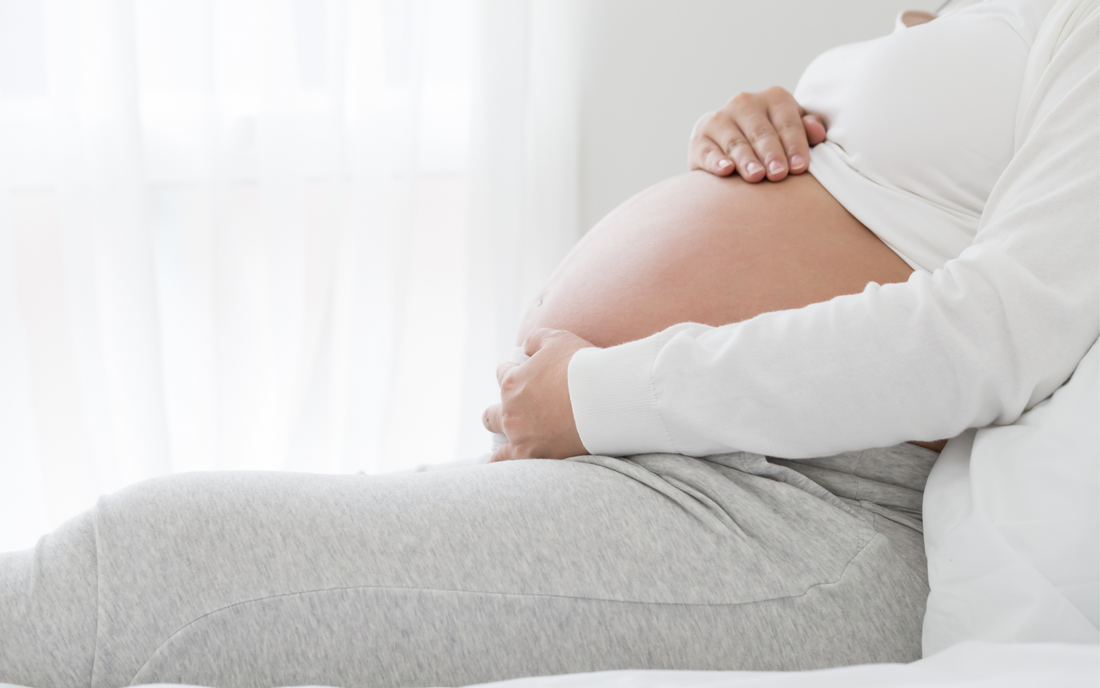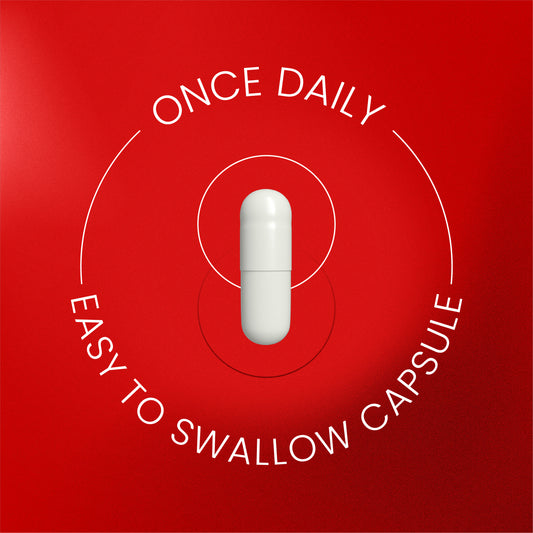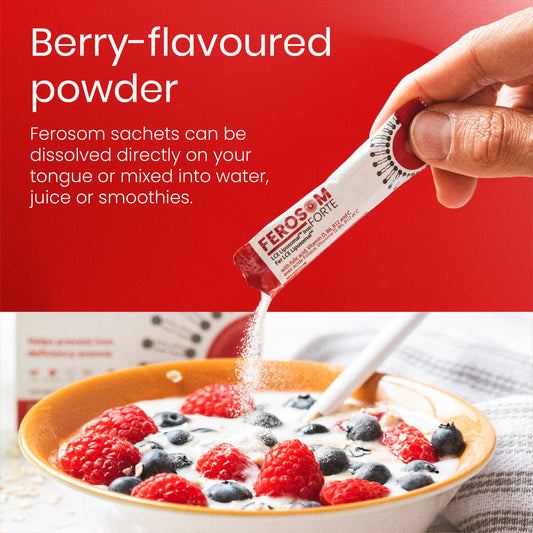

Pregnancy is best summed up in two words: “wonderful” and “challenging!” If you’re dealing with an iron deficiency during pregnancy, you’ll know that it doesn’t make the months any more wonderful. But more challenging? Without a doubt.
At this point, you might be feeling frustrated or worried about what the health implications of low iron are for you and your baby. Having another source of stress to deal with -- on top of everything else that comes with pregnancy -- isn’t exactly ideal.
The team at Ferosom Canada is always here to help if you need to boost your iron levels. But first, let’s outline what’s in store for today’s blog:
-
Is Iron Necessary During Pregnancy… If So, How Much Do I Need?
-
What Are the Symptoms of Low Iron During Pregnancy?
-
Iron-Rich Foods for Pregnancy
-
What’s the Best Canadian Iron Supplement for Pregnancy?
-
When to Start Iron Supplements or Tablets in Pregnancy?
- Should I Take Iron Before or After a Meal During Pregnancy?
Do feel free to scroll down to the section that’s most relevant to you. Otherwise, let’s get started!
Is Iron Necessary During Pregnancy… If So, How Much Do I Need?
Everyone needs iron, but the mineral becomes even more essential for pregnant women. Iron stores in the body have to be high enough to support two people, rather than the usual one!
A greater amount of iron is needed during pregnancy, to both build the placenta and produce more red blood cells for gestation. When it comes to the health of you and your baby, a good way to think of iron is as a “prevention powerhouse.”
By getting enough of the mineral, you can lower the risks of:
- Anemia
- Uterus malfunction
- Premature birth
- Low birth weight baby
- Infant death
- Low milk supply
- Postpartum depression
Yet, only 50% of pregnant women are thought to have sufficient levels of iron -- a concerning statistic once you know about all of the reasons why iron is so necessary during pregnancy.
A depleted iron store can reduce the level of hemoglobin in the body, which is a protein in red blood cells that ensures your tissues have enough oxygen. And when your red blood cell count is low, it indicates you have anemia.
Aside from the physical demands of pregnancy, causes of lowered iron can include:
- Not eating enough iron-rich foods
- Heavy menstruation before pregnancy
- Pre-existing blood conditions
- Inflammatory disorders
Here’s a graphic showing some of the causes and effects of an iron deficiency during pregnancy:

Now that we’ve discussed the importance of iron, the real question is… How much iron do you need during pregnancy?
Medical experts say that, on average, a pregnant woman will need 30 mg of iron every day. Still, there are a few situations where your daily intake should be higher than this to prevent an iron deficiency during pregnancy. These include:
- If you had low iron levels before pregnancy
- If you did not take enough iron in the earlier stages of pregnancy
- If you’re due to have twins or triplets
For women who have already given birth and are now breastfeeding, those aged 19 or older will need a minimum of 9 mg of iron a day, whereas those under the age of 19 will need 10 mg a day.
What Are the Symptoms of Low Iron During Pregnancy?
Symptoms of low iron in pregnancy can range from mild to pretty nasty. Fatigue and shortness of breath are two of the most common symptoms of an iron deficiency during pregnancy. However, you may experience other symptoms, such as:
- Brittle nails
- Cold hands or feet
- Feeling faint, light-headed, or weak
- Hair loss
- Headaches
- Increased heart rate
- Restless legs syndrome
- Skin that is pale, dry, or easily bruised
- Sore or swollen tongue
To find out more, check out this useful slideshow on Health.com, which features 15 of the main signs of an iron deficiency.
Iron-Rich Foods for Pregnancy
The infamous pregnancy cravings… have you had them yet? About 12 weeks into pregnancy, many women get sudden (and sometimes odd!) food cravings...
Pie, ice cream, even pickles -- the cravings can be pretty random.
Unless you have food allergies or a particular health condition, it’s usually fine to listen to these cravings and eat what you feel like. But you’ll also need to make sure you’re consuming enough iron.
A misconception is that meat is the only iron food source. While chicken, liver, and red meat are great go-tos for iron, they’re far from the only options…

To see the exact amount of iron in different foods, here’s an easy-read list put together by Verywell Family:
- Beans: 4 to 6 mg per cup
- Beets: 1 mg per cup
- Broccoli (chopped): 0.7 mg per cup
- Brussels sprouts: 1 mg per cup
- Dark leafy greens (e.g. kale, spinach): 3 mg per 1/2 cup cooked greens
- Dried fruit (e.g. raisins, figs, apricots): 1 mg per 1/4 cup
- Eggs: 1 mg per large egg
- Lentils: 4 to 6 mg per cup
- Meat (e.g. liver, chicken, pork): 2 to 3 mg per 3-ounce serving
- Oatmeal: 2 mg per cup
- Oysters: 8 mg per 3-ounce serving
- Peas: 4 to 6 mg per cup
- Potatoes (diced): 1.2 mg per cup
- Raspberries: 0.8 mg per cup
- Sauerkraut: 2 mg per cup
- Tofu: 3 mg per 1/2 cup
- Tuna: 1 mg per 3-ounce serving
- Whole-wheat bread: 0.5 mg per slice
What’s the Best Canadian Iron Supplement for Pregnancy?
Well, we’ve got to admit our team at Ferosom Canada is going to be a little biased here!
The truth is, though, Ferosom Forte is proving to be one of the best iron supplements for pregnancy in Canada. And here’s why:

You’re probably wanting a supplement that reduces potential side effects and is absorbed well. So what’s the solution?
Well, Ferosom Forte is comparable to IV iron and available in capsules or sachets, depending on your preference. It’s also gluten-free, vegan, halal, and non-GMO.
We’ll provide you with the links for the capsules and sachets in a minute, in case you wish to browse them online. Before this, though, let’s answer a couple of common questions about iron supplementation.
When to Start Iron Supplements or Tablets in Pregnancy?
You know that quote “timing is everything”...?
It’s certainly true to reduce the chance of an iron deficiency during pregnancy. The CDC (Centres for Disease Control and Prevention) advises that the best time to start iron supplements/tablets in pregnancy is when you have your first prenatal appointment.
If you’re supplementing with 30 mg of iron a day (for example, with a prenatal vitamin), this should be enough for most women to maintain a healthy amount of iron.
Should I Take Iron Before or After a Meal During Pregnancy?
Another sensible question to ask is whether to take iron before or after a meal during pregnancy. Healthline states that iron supplements are most effective when taken on an empty stomach.
Unfortunately, some iron tablets can make symptoms of pregnancy (e.g. nausea and vomiting) worse… Nobody wants that! Therefore, it’s best to look for a supplement with minimal side effects. You can ask your doctor for recommendations, as they should be able to tell you what the best pregnancy safe iron supplements on the market are.
If you find that taking iron on an empty stomach is too uncomfortable, an alternative can be to have it with a snack, rather than with a full meal.
Also, remember to avoid drinking tea with your meals, as this can affect how well your body absorbs iron from food. Water or diluted juice is the better choice for meal-time drinks.
Ready to browse the best supplements to boost your iron levels during pregnancy? As promised, the links for both the Ferosom Forte iron sachets and capsules are below.


Many thanks for reading our article on iron deficiency during pregnancy. It’s an important topic to cover, so we hope we’ve done it justice!
If you would like to find out how Ferosom Forte is made and why it’s more advanced than typical Canadian iron supplements, feel free to read more here.
To health and wellness,
Ferosom Canada
Need medical advice on how to manage low iron symptoms during pregnancy?
Request a call back from a Canadian doctor using this booking page. 7 Days A Week, 8:00 AM - 6:00 PM EST.






